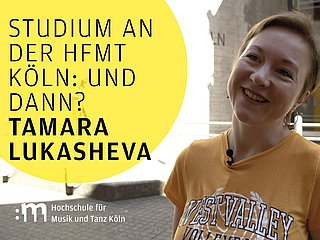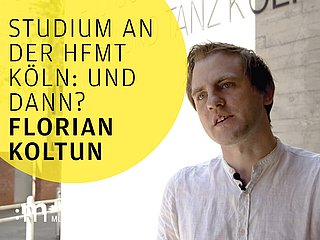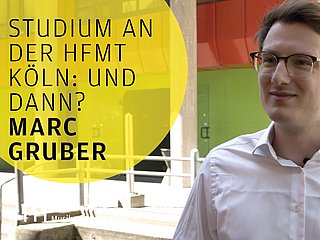Alumni
In good company - the alumni
The name of the Cologne University of Music and Dance is a cultural trademark not only in Germany, but also far beyond national borders. The university's good reputation is guaranteed not only by its qualified education, wide range of courses and internationality, but also by our former students and teachers - the so-called alumni - who have asserted themselves in international cultural life or even taken completely new paths away from an artistic career.
We warmly welcome all graduates of the university, whether former students, teachers or administrative staff, to our alumni network.
We would like to stay in contact with you, inform you regularly about news and invite you to special events. You can register for our alumni network at any time at alumni@hfmt-koeln.de.
Things were already flying through the auditorium...from drones to toilet paper.
Testimonials
We asked our alumni what they particularly like to remember. Their answers show how formative their time as students was - personally, academically and personally. Read for yourself what our former students have to say about their time with us.
Elsa Artmann
Subject
- Dance / Dance education
Graduation year
- 2017
Current job | position | employer
- Artistic director of the ensemble SANFTE ARBEIT, Cologne
- Teaching at the University of Cologne and the University of Art and Design Graz
- Freelance dancer, e.g. in the Forward Dance Company, Lofft - das Theater Leipzig
Photo: Arne Schmitt
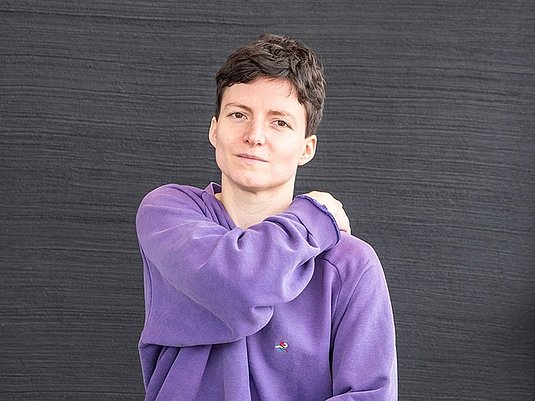
Elsa Artmann tells the story:
- Studied painting (Academy of Visual Arts Leipzig, diploma 2014, master student 2018
- BA Dance at the Center for Contemporary Dance 2017
- Since then freelance work as a dancer and choreographer
Why did you decide to study at the HfMT Cologne?
In the middle of my painting studies in Leipzig, I decided to move to Cologne to study dance. My desire was to be able to connect my artistic practice more closely with my body and to work more openly with other people than I thought possible in painting. I chose Cologne because I had the impression that a lot of physical and contextual knowledge would be shared with me and that I was welcome with my background and interests.
When you think back to your time at the HfMT Cologne, what do you particularly remember?
I think of a time when I was intensely and sometimes obsessively engaged with my body and the expansion of its boundaries, and how we as a group balanced the subtleties that make the difference between trust, autonomy, empowerment, generosity, control and judgment towards our own bodies and those of others. I remember an almost conspiratorial solidarity and simultaneous isolation in training and in taking different paths in dance.
What advice would you give today's students?
I don't know the situation of today's students, but I could have heard the following myself during my studies: It's okay to rest. Your ability as a dancer, your perspective as a person and artist is not measured by how quickly an injury heals or who chooses you in an audition in your second year. You and the people you move through your studies with are all on their own and different paths that cannot be compared with each other. The people you study with are there to admire and cheer each other on: You are as great as you think each other is. You will soon determine the criteria that your own work should meet. Along the way, you can look with interest at the concepts and beliefs that emerge from other people's life experiences. Also: it is possible and, in case of doubt, a bit of a shame not to go partying enough.
To what extent do you apply what you have learned during your studies in your professional life?
For me, the experience of immersing myself in various aspects of my own physicality with time and open interest was less important than a specific technique. To take the body seriously as a content-related arena, as both perceiving and acting. In the contexts in which I myself work, this is sometimes not possible in such detail and sometimes the memory of it has to suffice. So it's good that I was able to experience this!
Is there a little anecdote from your student days that you would like to share?
Perhaps less an anecdote than a favorite re-occurring moment: senior year, the last class on Friday morning, my body all tired and full and disengaged from the previous week, Kojiro sharing either breathing patterns or other minimal physical starting points with us instead of movement sequences, most of that 1.5 hours we follow them loosely and absorbedly, being each other's audience, my body making and feeling movements that I can only do at all within that time each, that have taken the preparation of that whole week and also that that whole week doesn't matter now either. Sometimes, while gathering my socks and sweaters, I have the simultaneous feeling of: There is so much more, and: That's enough for now.
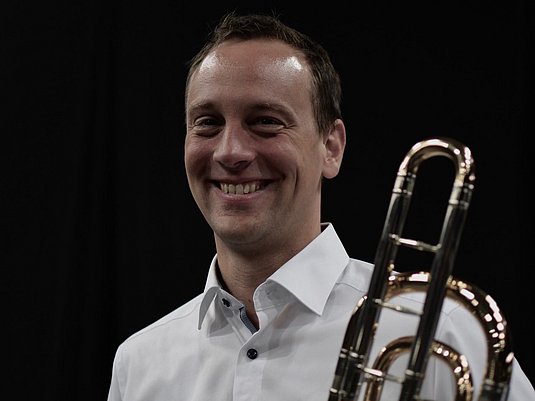
Jan Böhme
Subject
- Teacher training / Diploma orchestral musician
Year of graduation
- 2004
Current job | position | employer
- Gürzenich Orchestra Cologne
- HfMT Cologne
Photo: Holger Pfeuffer
Jan Böhme tells the story:
Jan Böhme, born in Bonn in 1977, began trombone lessons with Hans Espe at the Witten Music School in 1989. He was a member of the NRW State Youth Orchestra from 1995/9696 and at the same time studied as a junior student at the Cologne University of Music with Michael Junghans.
From 1996/97 he was a conscript in the Bundeswehr Staff Music Corps in Siegburg. He then began studying artistic instrumental training with bass trombone as his main subject at the Cologne University of Music. His first engagement was in 1998 with the Münster Symphony Orchestra, followed by further positions with the Hagen Symphony Orchestra and the Duisburg Philharmonic Orchestra. Since 2006, Jan Böhme has been bass trombonist in the Gürzenich Orchestra Cologne. He is a regular guest with renowned orchestras such as the Leipzig Gewandhaus Orchestra, the Bavarian State Orchestra Munich, the Munich Philharmonic Orchestra, the WDR Symphony Orchestra, the Hamburg Philharmonic State Orchestra, etc.
Tours have taken him to North and South America, Asia and Europe.
With the Quadriga Trombone Quartet, he has won prizes at international competitions for brass chamber music.
Since the winter semester 2016/17, he has been a lecturer for trombone and bass trombone at the Cologne University of Music and Dance. Workshops and master classes throughout Germany round off his teaching activities.
He has also been arranging music for brass ensembles for many years, which has been performed in the Cologne Philharmonic and the Nuremberg State Theater, among others.
Why did you decide to study at the HfMT Cologne?
At the time, the HfMT Cologne was the only bass trombone teacher in NRW.
When you think back to your time at the HfMT Cologne, what do you particularly remember?
The unfortunately catastrophic practice situation...
What advice would you give today's students?
Believe in yourselves and work hard!
To what extent do you apply what you have learned during your studies in your professional life?
A lot of content is applied in my daily work. Harmony theory, ear training, chamber music, wind band exercises, university orchestras, daily practicing with my fellow students, etc..
Anna Lucia Richter
Subject
- Junior studies and Bachelor's degree in singing
Graduation year
- 2013
Current job | position | employer
- Internationally active mezzo-soprano in the fields of song / concert / opera
- Singing teacher
Photo: Jessylee
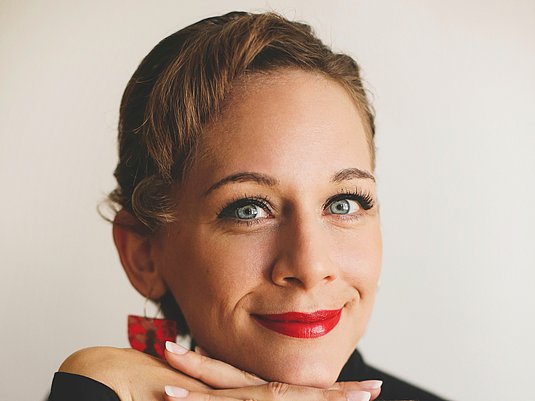
Anna Lucia Richter tells the story:
Why did you decide to study at the HfMT Cologne?
In my family, one family member from each generation has always studied at the HfMT Cologne for over 100 years. What's more, I was living near Cologne at the time and was still doing my A-levels alongside my junior degree. It was easy to combine. Before that, I had already had private lessons with Prof. Kurt Widmer at the Schola Cantorum in Basel for a few years, but I always needed time off from school. That's why I switched to Cologne for the more demanding upper school.
When you think back to your time at the HfMT Cologne, what do you particularly remember?
A huge rollercoaster and a carousel of experiences and adventures. There was so much going on at the same time. Learning new things, self-discovery, making friends and getting to grips with the emerging career hype.
What advice would you give today's students?
Listen to your gut feeling. No one else can say 100% whether something is right or wrong and whether it comes at the right time. Trust a few people in the scene, but trust them without ifs and buts. Be disciplined, but not dogged. Read and listen to and watch as much culture as possible: books, films, theater, opera, concerts... more is more in this case. Be as gracious with yourself as you are with others. Do not compare yourselves. That is an insidious poison.
To what extent do you apply what you have learned during your studies in your professional life?
Main subject lessons, of course. Reed singing. Acting. Ear training. Movement theory. Too bad we didn't have a literature subject back then: We singers always interpret texts. Tax law for freelancers would also have been important. Is that available today?
Is there a little anecdote from your student days that you would like to share?
During the semester break, I once practiced in a main subject room. At some point there was a very strange smell. I went out into the corridor and there was an extremely intense smell of gas in the air. I thought everything was about to explode. So I went down to the doorman and let him know. Whereupon he said succinctly: "Well, it's been smelling like that for a week. But I think you singers have just breathed away all the oxygen...!" I decided to go home anyway ;-)
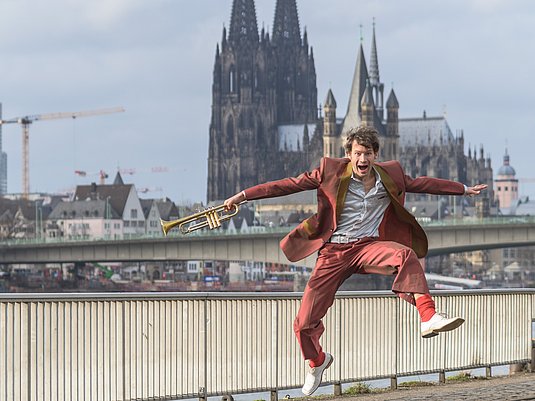
Matthias Schriefl
Subject
- Trumpet (Jazz)
Year of graduation
- 2007
Current job | position | employer
- Professor of jazz trumpet at the State University of Music and Performing Arts Stuttgart
- Composer / arranger / soloist for international ensembles of all sizes and playing styles
- Leader of many of his own bands
Photo: Jürgen Bindrim
Matthias Schriefl tells the story:
Why did you decide to study at the HfMT Cologne?
I really wanted to go to Cologne - especially because of Andy Haderer. I already knew him from the BujazzO, where he was a very committed and competent trumpet teacher. Andy puts his heart and soul into his teaching, and as - in my opinion - the world's best lead trumpet player, he doesn't need many words, sometimes he just has to play something briefly and then everything is clear.
Another, more spontaneous reason was an experience shortly before the audition: at the time, an Interregio - my favorite train at the time - had a 25-minute stop at Cologne Central Station. I left all my luggage on the train, ran to the cathedral with a friend from BujazzO, took a quick look inside and ran back. Everything was still intact in the compartment - and somehow I immediately felt that the people in Cologne were friendly. The city seemed like a big village to me. Since I come from a pilgrimage village with only 200 inhabitants, I felt right at home - especially because I like cities with a clear center. A big church and a river and being on first-name terms are all part of it. In hindsight, it was definitely the right decision!
When you think back to your time at the HfMT Cologne, what do you particularly remember?
There were many inspiring workshops with external musicians - for example with Nils Wogram's Root 70 - which had a huge impact on me. The sessions with other students, where I was able to try out my own pieces, were particularly important to me.
I also learned a lot in the inspiring courses with Bill Dobbins. I also made many deep friendships - including with classical music students, with whom I exchanged ideas intensively. We gave each other lessons and benefited greatly from each other. The many sessions and parties with the other students are also part of this valuable time for me.
What advice would you give today's students?
Accept all the offers you can get! For example, be grateful for the minor in piano lessons - you may never get such good piano lessons again. Take advantage of it and practise the piano! Take voluntary courses, for example with Siggi Köpf - unfortunately I missed that one back then.
And at least listen to what your teachers want to tell you. You can decide for yourself later what you put into practice. You have to go your own way - not someone else's. And you don't have to copy everything that the masses do. Nevertheless, it's important to learn with humility, especially from experienced musicians. They are simply many kilometers ahead of you in many ways.
Be grateful for the opportunity to study music and enjoy it! And if you realize that it just doesn't work with your main subject lecturer - change. Sometimes the chemistry is right, sometimes not. In the end, you are your own most important teacher - for life. And you will remain a student for life if you are serious about music, because this study and this love never ends!
To what extent do you apply what you have learned during your studies in your professional life?
Everything I learned at the HfMT I could use at some point. The lessons were very efficient and I wanted to learn a lot of what was taught myself anyway. I didn't even have to attend harmony and ear training regularly - the exams were enough, and I'm very grateful to the teachers for that.
The lessons with Bill Dobbins in particular were incredibly inspiring - every minute was valuable. And it was often the same with Andy: I came out of the lessons and was able to play better straight away.
Some contacts from my studies - for example with Simon Rummel - only led to working together in bands years later. We were still on different planets during our studies.
Is there a little anecdote from your student days that you would like to share?
There are many - including some that I'm not particularly proud of. Back then, I was even more childish and rebellious in many ways than I am today.
For example, there were always long queues outside the rehearsal rooms - and I didn't feel like waiting. So I thought of tricks to be able to practise anyway. I often jammed with a friend in front of an emergency exit or practiced in the backstage area of the chamber music hall.
There was also a porter who was about to retire at the time and didn't always have a clear overview. I often spontaneously gave him a made-up room number and asked for a key. If the room was currently occupied, I simply called another one - I usually had a key in my hand on the third attempt and could get started.
Once I called the number of the foreign office by mistake. The porter gave me the key and I ended up in an office. I practiced there for four hours - without touching anything - and then simply gave the key back. I was a bit scared that someone would come in, but in the end it was a very productive practice session - and it didn't hurt anyone.
Aleksey Semenenko
Subject
- Violin
Graduation year
- 2017
Current job | position | employer
- Professor at the Folkwang University of the Arts Essen
- Occasional concert violinist
Photo: Alexander Basta
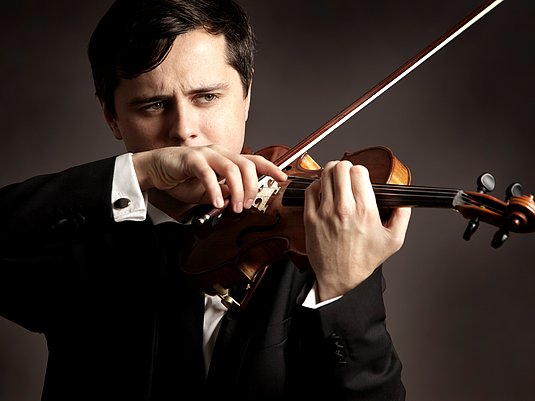
Aleksey Semenenko tells the story:
Career
Complicated
Why did you decide to study at the HfMT Cologne?
Because of Prof. Zakhar Bron, who was working at three European universities at the time. Madrid was too far for me, Zurich too expensive. Cologne - perfect!
When you think back to your time at the HfMT Cologne, what do you particularly remember?
My first impression was: "What ugly concrete walls..."
I was fascinated by the quality of the orchestra, especially under the direction of Michael Luig. Also the opportunity to meet so many people from different countries and hang out with them in shared flats. And of course the freedom - the freedom to be on my own. I came from far away, from the Ukraine.
What advice would you give today's students?
Please don't close yourselves off in your subject area or even your class, be interdisciplinary. The years go by very quickly.
To what extent do you apply what you have learned during your studies in your professional life?
I learned the most from Harald Schoneweg, the chamber music professor and my personal mentor. I apply a lot of his teachings and behavior in my profession as a professor.
Is there a little anecdote from your student days that you would like to share?
I found it very funny that my friends and acquaintances practiced at night for a while - secretly, of course. Someone sneaked in through the parking garage and opened the door for the others. Things were already flying through the auditorium... from drones to toilet paper. The whole thing was then brought to an end one day by the guard with the dog.
Interview with...

